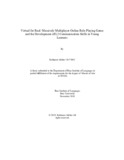Virtual for real: massively multiplayer online role playing game and the development of L2 communication skills in young learners

View/
Date
2019-11Publisher
Brac UniversityAuthor
Akther, KohinoorMetadata
Show full item recordAbstract
This thesis explores a massively multiplayer online role-playing game (MMORPG) and its
positive effects on five young second language learners’ development of communicative skills
in L2. These five 10-14 years old learners as the focus group (FG) belong to Bangla medium
schools in urban setting of Chattagram city, Bangladesh. They play at home the popular online
commercial-off-the-shelf (COTS) game player unknown’s battle ground (PUBG) sixty minutes
per day without any pedagogical intervention. From close studies, it is found that they transfer
the online language experiences, i.e. new vocabularies, expressions, knowledge learnt and used
with the co-players to the use of real life world. This ground supports the study also to
concentrate on the use, development and transferring of these skills from in-game to out-ofgame
contexts, that is, from informal to formal L2 environment. Multi player game helps one
interact with other players as serving some needs by playing certain roles in a team. This is a
target-based team playing game where exposure to use L2 in a social and contextual way
happens. Although language focus is a secondary issue of most of the (COTS) games, playing
requires a common language to communicate with the coplayers. Social and collaborative turns
in this type of game makes a learner use the target language (English) as the lingua franca of
the online players. These playing and interaction matters support the player to develop new L2
vocabularies and other communication skills to use them with the context of the game. As a
result, L2 learning takes place out of classroom informally in a playful manner which is anxiety
free and non-threatening. Knowledge gathered through fun and amusement exists for long
which can go beyond the gaming contexts. The study helps discover the fact that a learner’s
motivation, involvement and readiness to interact in the game to achieve some goal in informal
scenario can effectively support him/her confidently learn and use L2 in the formal setting of
classrooms. Also the study tries to make a ground that selective inclusion of game in the
classroom L2 education can make young classrooms more effective, autonomous and goaloriented.
